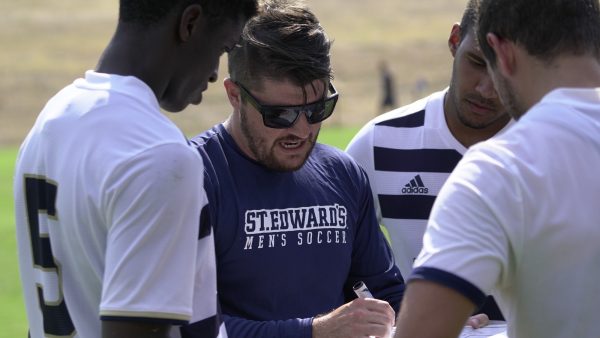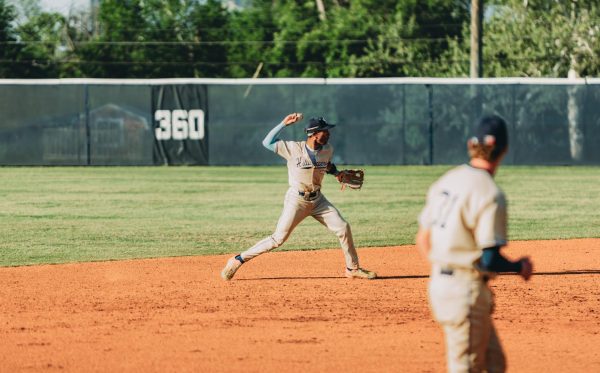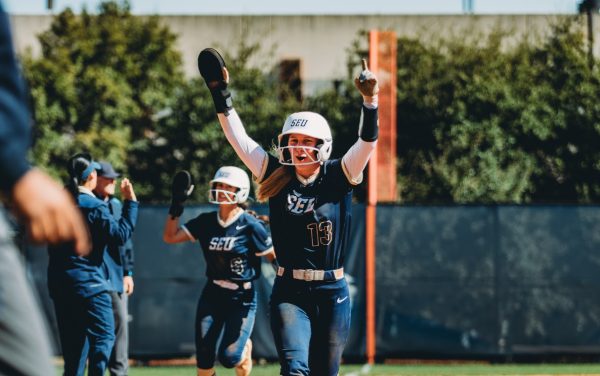World Series teams unexpected
It felt inevitable. Worst of all, it would’ve emboldened the famously east-coast-centric sports media—who revere the likes of the New York Yankees, Boston Red Sox and Philadelphia Phillies—in their thinking that their hallowed ground represents the unquestioned epicenter of America’s sports landscape.
Another Yankees/Phillies World Series would’ve been hard to stomach for loyalists in the sports’ other 28 markets. For all the circumstance that would’ve accompanied a repeat collision of baseball’s most legendary franchise with the contemporary Yankee incarnates of the National League, the prevailing take across much of America would echo the invectives of years’ gone by: that championships can be purchased and Major League Baseball suffers from a fundamental competitive imbalance. Fortunately, the financial state of the game failed to seep into 2010’s fall classic, as two other franchises will square off to make history Wednesday night in San Francisco.
But before the World Series barrels ahead, it is important to look at the ways in which both teams got here: hitting and pitching that was both timely and dominating.
A dispiriting, Texas-sized ALCS Game 1 meltdown in the eighth inning gifted the Yankees their 10th consecutive playoff victory over the Rangers. What was already the most illustrious season in Rangers history swelled the next day when Texas overmatched Yankee starter Phil Hughes—who surrendered seven runs in four-plus innings, defeating the Yankees 7-2 in Arlington.
At Game 3 in the Bronx, Cliff Lee bedazzled once more in the Rangers’ lopsided 8-0 win, striking out 13 confused Yankee hitters in a scintillating performance in which he became the first pitcher in Major League history to strike out 10 plus hitters three times in a single postseason. With every win signifying uncharted territory, the Rangers impressively marched on in Game 4. Starter A.J. Burnett had two outs in the sixth inning after Yankee manager Joe Girardi ordered an intentional walk of lefty David Murphy in favor of light-hitting catcher Bengie Molina. Girardi knew instantly that he underestimated the veteran backstop when Molina walloped Burnett’s first pitch—a 92-mph fastball—into the crowd in left field. Texas won again, 10-3.
Game 1’s uproarious eighth-inning Yankee onslaught in Arlington shone dimly as the lone instance where New York exhibited life. The defending champions looked otherwise impotent at the plate, insecure on the mound, and old and slow overall. Perhaps it was that trademark “Yankee pride” alone, coupled with a desperate pull to avoid being upstaged at home, that fueled New York’s 6-2 Game 5 victory. Friday night’s World-Series clinching win in Game 6 will stand as the defining day in Ranger’s history. That is, unless they can overtake the upstart San Francisco Giants for the World Series title.
Nobody thought the Giants would be in the World Series either. Playing in a division most prognosticators conceded to the 2008 National League champion Colorado Rockies in March, the Giants were an afterthought as offenses go, but deep and formidable on the mound. Two-time reigning Cy Young winner Tim Lincecum and the Phillies’ prized off-season acquisition Roy Halladay squared off for Game 1 in Philadelphia. But the spotlight was stolen by Giants outfielder Cody Ross, who homered twice off the previously untouchable Halladay, carrying his team to a gritty Game 1 victory.
The Phillies—with all their pedigree and experience in these contests—saved face in Game 2 on the strength of Roy Oswalt’s eight-inning gem—three hits, one earned run, three walks and nine strikeouts.
Runs were again in short supply for Game 3, to Giants starter Matt Cain’s benefit: Cain muted the prolific Philadelphia bats while dark-horse Cody Ross provided another clutch spark with an RBI base-hit—San Francisco won, 3-0.
With the series’ pitching moguls resting their tired arms, Game 4’s pedestrian billing of San Francisco’s Madison Bumgarner and Philadelphia’s Joe Blanton lacked the fanfare seen in the first three games. Both Bumgarner and Blanton were spotty in their respective four innings of work, and the bullpens were charged with damage control. But with a deadlocked score in the ninth, Phillies manager Charlie Manual surprisingly opted for starter Roy Oswalt over closer Brad Lidge in relief, a move that backfired. Giants shortstop Juan Uribe’s ninth inning sacrifice fly sealed the win for San Francisco, 6-5.
Halladay returned in Game 5 to rescue Philadelphia’s season—and did so: battling through six innings, allowing two-runs and relying on a late Jayson Werth homerun to cement the victory, 3-1.
The Giants’ series clinching victory in Game 6 at Philadelphia—3-2—drove another stake into the hearts of the baseball intelligentsia, most of whom believed the Giants let Philadelphia wriggle off the hook at home in Game 5, and would be doomed to blow the series as a result. It just didn’t happen.
The year 2010 was dubbed “the year of the pitcher” in recognition of the flurry of no-hitters and perfect games thrown during the regular season. This Rangers/Giants World Series will serve as a referendum on that statement, as Texas’ vaunted lineup will have its hands full with San Francisco’s stellar pitching, and vice-versa.






